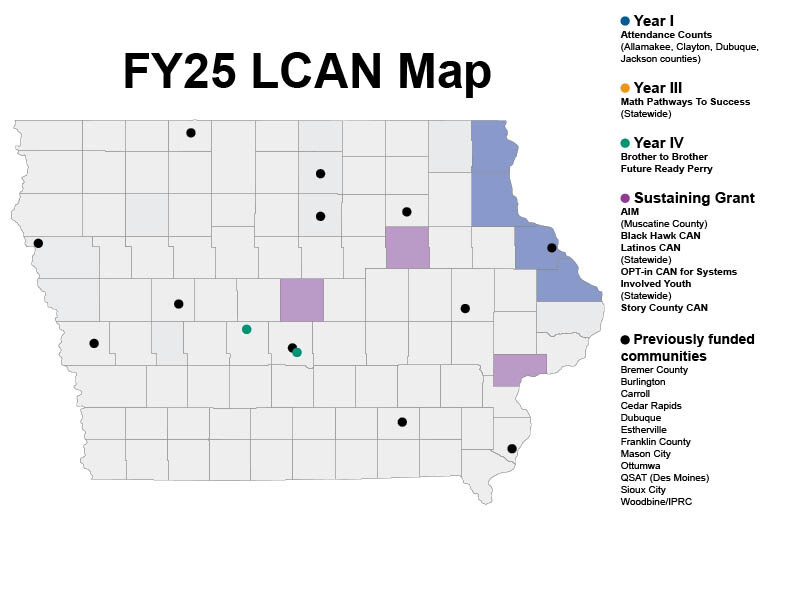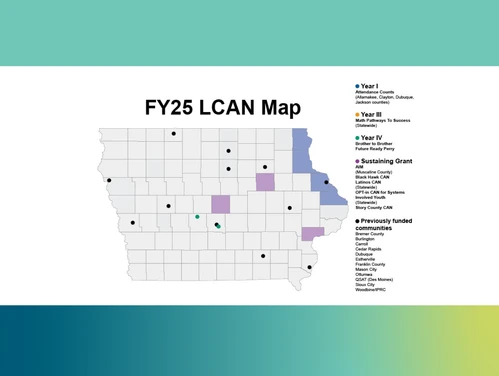In 2014, the Iowa College Aid, now a bureau of the Iowa Department of Education, adopted the motto, "College Changes Everything," launching a series of initiatives dedicated to building a locally driven and responsive educational attainment pipeline.
Ensuring all Iowans have access to the training and education for high-demand careers and local community success is a collective effort, yet many communities needed resources and guidance to align their efforts toward this common goal.
This presented an opportunity for the Bureau of Iowa College Aid to create its Local College Access Networks (LCAN) framework, which has since served nearly 25 communities across Iowa in increasing college and postsecondary education attainment. In an effort to be more inclusive of multiple postsecondary pathways, LCANs were rebranded as Local College and Career Access Networks in 2024 and are currently active in nine communities across Iowa.

LCANs work to assess the assets and needs of its community and fill the gaps in partnership with local colleges, school districts, area education agencies, business groups, elected officials, employers and religious organizations to drive postsecondary attainment. The current LCAN grant model offers a four-year funding structure with the potential for a fifth “sustaining” year of funding.
By using the Collective Impact framework, LCANs coordinate existing organizations and programs in the community to reduce barriers to college and career success. Unlike many similar initiatives, LCANs strive to create systems change in their communities. Collective Impact organizes multiple organizations to look for resources and solutions through the same lens with continuous feedback loops allowing for simultaneous unified responses to challenges.
This cross-sector approach asks LCANs to connect those resources in their community and align them to a common goal tailored to the needs of that community. For the Future Ready Perry LCAN, which is in the fourth year of its grant cycle, it has seen how this collaborative approach can have a transformative effect on its community.
“Our LCAN leadership team membership is a cross-sector of many different institutions within the Perry community,” said Future Ready Perry LCAN Coordinator Connie Saenz. “The collaboration between these organizations allows for usually unrelated institutions to become personally invested in the academic and educational success of the students in their community.”
Some of the organizations and businesses that help make Future Ready Perry a success include Des Moines Area Community College, Dallas County Hospital, Hy-Vee, Perry Lutheran Home, ISU Extension Hispanics United, Perry High School, iJAG, Perry Chamber of Commerce and the City of Perry.
The collaborative approach recognizes the nuanced societal challenges each community and population faces, from environmental issues, housing insecurity, healthcare access and postsecondary educational and career options as well as the long-term, community-focused, cross-sector approaches needed to address those barriers.
“We share a powerful vision that every student in our community has the opportunity for a bright future,” said Director of Aligned Impact Muscatine County (AIM) Kim Warren. “We believe this future is achievable only through deep collaboration with the families, educators and community members.”
AIM is one of nine current LCANs and has completed its grant cycle. It now receives a sustaining grant to offer continued support to its community by funding the continuation of the coordinator position as well as special projects and events. AIM earned the sustaining grant by successfully completing its multi-year grant cycle with SMART (specific, measurable, achievable, relevant and time-bound) goals that included increasing graduation rates among free and reduced-price lunch students by five percentage points and increasing postsecondary enrollment among minority students by 10 percentage points.
Since the program’s inception, more than 20 communities across Iowa have benefitted from the transformative impact of LCANs.
“Future Ready Perry helps bridge the gap for low-income, first-generation or underrepresented students so that they have the resources, support and information necessary to pursue an education that would otherwise be unreachable,” Saenz said. “Future Ready Perry increases access to education by helping students navigate the college application process and providing guidance with financial aid and college and program selection.”
In addition to reaching students directly, Future Ready Perry aspires to create a college-going culture that begins at home around the dinner table.
“The more the conversation around education circulates the home, the more attainable it can become for the students and the families,” Saenz said. “We believe that Future Ready Perry is vital for creating pathways to education that will prepare students to obtain the required education or training to meet workforce demands and achieve personal success.”
While individual student success is a paramount goal, LCANs strive for that student success to create a strong and vibrant community with thriving businesses and services that generate a sustainable array of careers and the talent pipeline to fill those roles.
“By fostering strong connections between students, educators and local industry leaders, the program aims to fill important roles in teaching, healthcare and the trades—fields that are vital to the community’s growth and sustainability,” Saenz said. “This initiative not only helps students succeed professionally but also strengthens the Perry community by ensuring that local talent remains in the area to meet its needs.”
Grant applications for the next series of LCAN grants will be available starting Jan. 28 New LCAN applicants can join an informational meeting on Feb. 6 for additional information. Direct questions about the LCAN grant can be directed to the Department’s Community Engagement Consultants, Anne Thomas at anne.thomas@iowa.gov or Megan Sibbel at megan.sibbel@iowa.gov.
